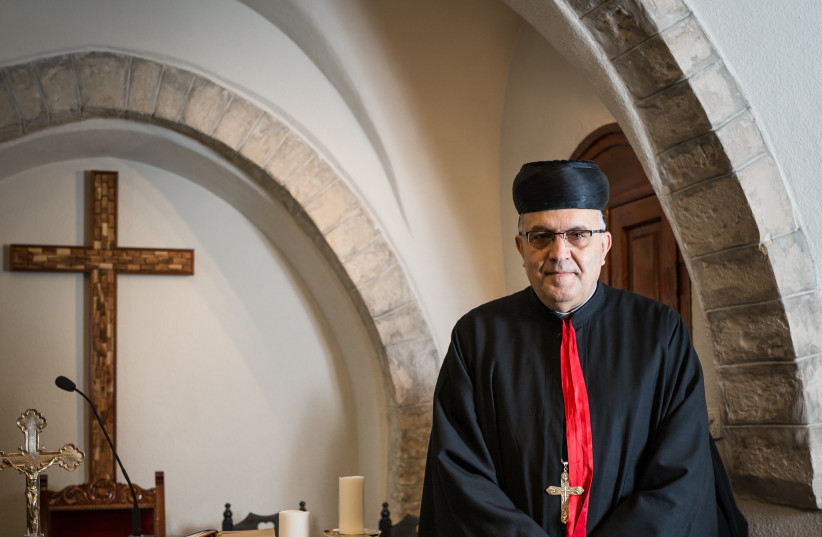Maronite Patriarch Bechara Boutros al-Rahi expressed outrage at the treatment of Maronite clerics and demanded that the Lebanese government meet the church's demands during a sermon Sunday, after Maronite Archbishop of Haifa and the Holy Land Moussa El-Hage was reportedly detained recently while carrying money and aid from Lebanese people living in Israel to their relatives in Lebanon.
The archbishop regularly travels between Lebanon and Israel under special arrangements made for Christian clergy, but this was the first time he had been detained in the process. Lebanese media reports indicated he was carrying money and medicine from Israel.
Justice Fadi Akiki, who is in charge of the file, told the Lebanese newspaper Annahar that the archbishop was carrying about $460,000, adding that the funds came from people residing in Israel, "the majority of whom work in the interest of the enemy."
The judge stressed that the money is subject to Lebanese laws concerning everything that enters Lebanon from Israel. "I respect the church, but there is a law that is the boycott of Israel and it is my duty as a judge to implement it," said Akiki.
The judge added that the archbishop was not arrested and was just subjected to the inspections at the crossing that everyone who uses the crossing has to go through, including UN officials.

On Sunday, Rahi demanded that officials rectify the situation, stating "What happened with Archbishop Moussa El-Hage constitutes a test of the ability of those responsible to put an end to the attack on the Maronite Church...Some were complaining about the interference of sects in the state, so the state attacked a founding sect and a cleric who was famous for his piety and serving the people, whom the state should have secured respect for in his movement between Lebanon and his diocese."
Rejecting claims that the transfer of funds from Lebanese citizens in Israel to their relatives in Lebanon is considered "working with the enemy," the Maronite patriarch stressed that "we affirm once again that 'working' with an enemy country has never been part of our culture, our spirituality and our dignity."
"We are the first to respect and defend the laws, so we ask the authorities to respect and abide by them. We are the first to respect the judiciary and defend it, but we ask judges and judicial officials to respect the sanctity of the judiciary and liberate it from maliciousness and dependence on political and sectarian forces," said Rahi.
The patriarch demanded that officials return El-Hage's phone and passport, as well as the funds and medicine he carried into Lebanon from Israel. Rahi also demanded that officials stop calling Lebanese citizens living in Israel "agents" and demanded that officials ensure that the archbishop can move between Israel and Lebanon without being detained or searched.
"If the official does not comply with these demands, they will cause great evil to our diocese in the Holy Land, as they prevent its bishop from going to it, and make it as if it were vacant, and this is a serious matter for which they will be held accountable," said Rahi.
Maronite Patriarch condemns clashes between Christians, Hezbollah
The Maronite cleric also referenced a clash between Hezbollah members and Christian residents of the town of Rmeish, calling on security services to protect the residents and guarantee their freedom to work in their land. Rahi stressed that according to UNSC Resolution 1791, no armed forces should be present in that area.
On Friday night, clashes broke out between Hezbollah members and residents of Rmeish after the residents began cutting down trees in an area reportedly near a post belonging to the terrorist movement. Hezbollah-affiliated journalists blamed the Christian Lebanese Forces party for the incident, claiming the party had come to cut down the trees. The Lebanese Forces rejected the claims.
The IDF has repeatedly warned that Hezbollah uses the Green Without Borders environmental organization as a cover for its activities near the border. The organization is known for planting trees in southern Lebanon.
In August 2017, Green Without Borders head Zouheir Nahle told The Daily Star that the trees the organization plants are "the shade of the resistance" and a "veil on the eyes of the enemy." Hezbollah Secretary-General Hassan Nasrallah stated in 2010 that planting trees was helpful to Hezbollah as operatives could use the trees to hide.
